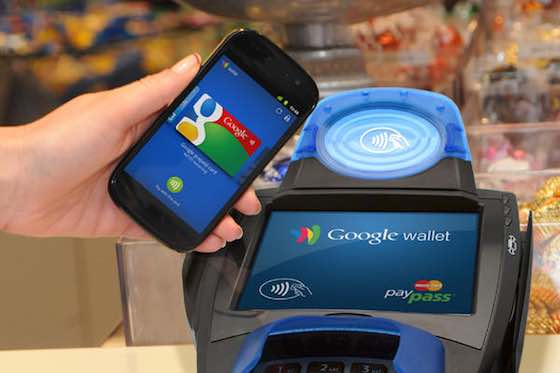- MENU
- HOME
- SEARCH
- WORLD
- MAIN
- AFRICA
- ASIA
- BALKANS
- EUROPE
- LATIN AMERICA
- MIDDLE EAST
- United Kingdom
- United States
- Argentina
- Australia
- Austria
- Benelux
- Brazil
- Canada
- China
- France
- Germany
- Greece
- Hungary
- India
- Indonesia
- Ireland
- Israel
- Italy
- Japan
- Korea
- Mexico
- New Zealand
- Pakistan
- Philippines
- Poland
- Russia
- South Africa
- Spain
- Taiwan
- Turkey
- USA
- BUSINESS
- WEALTH
- STOCKS
- TECH
- HEALTH
- LIFESTYLE
- ENTERTAINMENT
- SPORTS
- RSS
- iHaveNet.com: Vacation Travel

The Latest Buying Gimmick: 'Google Wallet'
by Ed Perkins
"Mobile payment" is finally hitting primetime, and Google Wallet is the first "digital wallet" entry. Opportunities to use it for now are extremely limited, but some very big players are betting heavily on the concept. And although conventional plastic won't disappear for a long time, new forms of payment will arrive in a big way in just a few years.
Briefly, the basic principle of "mobile payment" is the use of a "smart" phone to implement the payment. Instead of swiping a credit card, then either signing a chit or entering a PIN, the digital wallet makes the connection electronically through what's called "near field" communication:
Install an "app" on your phone, then to make a payment just enter a PIN on your phone and tap it on a reader.
Digital wallets are not independent payment systems. Instead, they link to whatever backup plastic you want to use -- credit cards, debit cards, prepaid cards, whatever -- and when fully implemented they can link with all the plastic you might ever want to use. That means your purchases are subject to the same fees and charges as if you used actual plastic, and you earn whatever rewards your regular plastic provides.
Digital wallet promoters claim that digital wallets are more secure than either stripe-and-sign or chip-and-pin systems that rely on physical cards. I'm not enough of a maven to verify or dispute those claims, but they at least seem rational.
So far, use is very limited. Google Wallet works only:
-- At merchants equipped with Citibank's Citi PayPass terminals -- and maybe potentially Visa payWave terminals.
-- With MasterCards pre-qualified for CitiPass or a Google Prepaid Card.
-- On Android phones (but an iPhone app is planned soon).
-- Through the
Presumably the folks behind the system will be expanding on all of these limitations as quickly as they can. And at least three other heavy hitters are working on digital wallet programs: Visa,
Long term, the technology embedded in the digital wallet will be used for many other travel applications, including doubling as gate passes, boarding passes, baggage claim checks, airport lounge club access, and such. Similar systems are already used by some transit systems for vehicle or platform entry. The promoters' hype says that the digital wallet will ultimately be a surrogate for "thousands" of payment and related plastic cards.
None of this will happen overnight. Plastic will continue to be mainstream for years to come and "legacy" use will probably extend for another decade or two. Moreover, unlike the case of chip-and-pin credit cards, you won't soon be traveling anywhere that a digital wallet is the only way to make some purchases.
But it's equally clear that the world is going digital, and that includes digital wallets. So, what can you do to prepare yourself for this brave new world?
Probably the most important near-term change is that, sooner rather than later, the entire travel system will expect you to have a "smart" phone or pad of some kind. Even if you're a confirmed Luddite, don't panic at that possibility: Although the "latest and greatest" smartphones remain extremely expensive, the big wireless systems all offer at least one baseline smartphone either "free" or with a minimal payment. Just upgrade the next time your wireless contract allows -- typically every two years.
You will want to track the availability of digit wallet systems that work with the card(s) and the bank(s) you regularly use. That will probably dictate your choice of hardware and systems.
And you will want to observe the ways in which a digital wallet can save you time and reduce the hassles of travel. Even if you're a slow adapter, you'll want to move at that point.
Article: Copyright ©, Tribune Media Services Inc.
Vacations & Travel "The Latest Buying Gimmick: 'Google Wallet'"